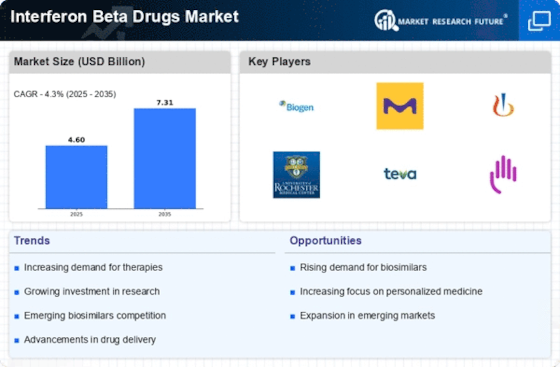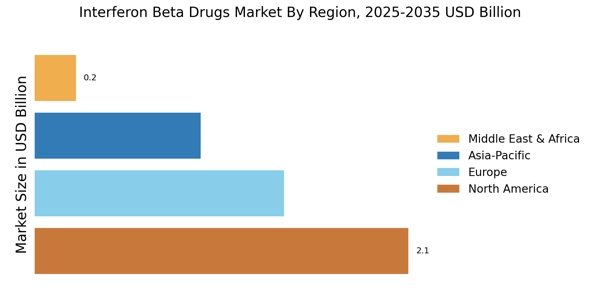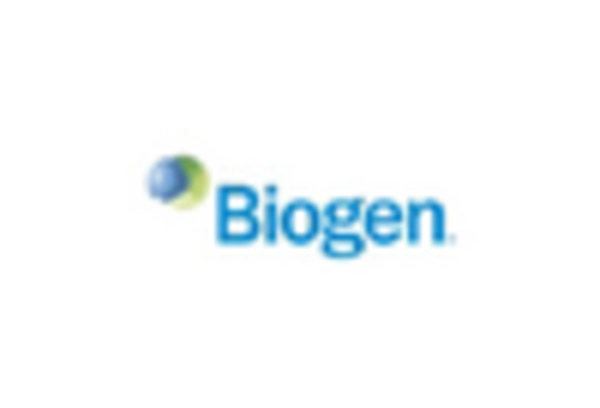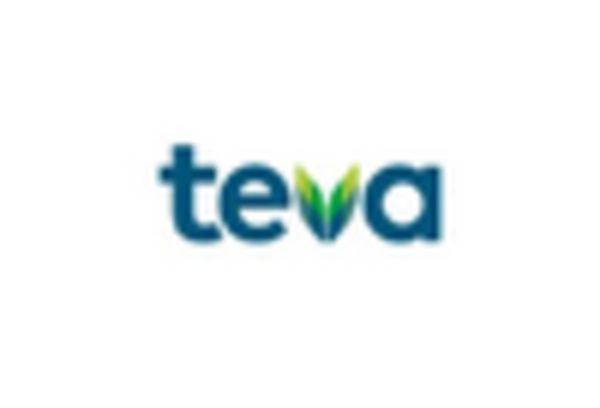Growing Demand for Biologics
The increasing demand for biologics is reshaping the Interferon Beta Drugs Market. Biologics, including interferon beta drugs, are gaining popularity due to their targeted mechanisms of action and favorable safety profiles. As patients and healthcare providers seek more effective treatment options, the shift towards biologics is becoming more pronounced. Market data suggests that the biologics segment is expected to witness substantial growth, driven by the rising prevalence of autoimmune diseases and the need for specialized therapies. This trend is likely to encourage pharmaceutical companies to focus on the development of new interferon beta formulations, thereby expanding the market and providing patients with more choices in their treatment regimens.
Rising Healthcare Expenditure
The increase in healthcare expenditure is a significant driver for the Interferon Beta Drugs Market. As countries allocate more resources to healthcare, there is a corresponding rise in the availability and accessibility of advanced treatment options for chronic diseases like MS. This trend is particularly evident in regions where healthcare reforms are underway, leading to improved insurance coverage for patients requiring interferon beta therapies. The willingness of healthcare systems to invest in innovative treatments reflects a broader commitment to enhancing patient care. Consequently, as more patients gain access to these therapies, the demand for interferon beta drugs is expected to rise, further propelling market growth.
Regulatory Support and Approvals
Regulatory support plays a crucial role in shaping the Interferon Beta Drugs Market. Authorities are increasingly recognizing the therapeutic benefits of interferon beta drugs, leading to expedited approval processes for new formulations and indications. This regulatory environment fosters innovation and encourages pharmaceutical companies to invest in the development of interferon beta therapies. For example, recent approvals for new delivery systems and combination therapies have expanded treatment options for patients. Moreover, the establishment of clear guidelines for the use of interferon beta in clinical practice enhances physician confidence in prescribing these medications. As regulatory bodies continue to support the development of effective treatments, the market is likely to experience sustained growth.
Advancements in Pharmaceutical Research
Innovations in pharmaceutical research are significantly influencing the Interferon Beta Drugs Market. The development of novel formulations and delivery methods enhances the therapeutic efficacy of interferon beta drugs. For instance, the introduction of long-acting formulations has the potential to improve patient adherence by reducing the frequency of administration. Additionally, ongoing clinical trials are exploring the use of interferon beta in combination therapies, which may expand its application beyond MS to other autoimmune disorders. These advancements not only promise to improve patient outcomes but also stimulate market growth as new products enter the market. The continuous investment in research and development by pharmaceutical companies indicates a robust pipeline of interferon beta drugs, which could reshape treatment paradigms.
Increasing Prevalence of Multiple Sclerosis
The rising incidence of multiple sclerosis (MS) is a primary driver for the Interferon Beta Drugs Market. As MS affects millions worldwide, the demand for effective treatment options continues to grow. Recent estimates indicate that approximately 2.3 million individuals are living with MS globally, leading to a heightened need for therapies that can manage symptoms and slow disease progression. Interferon beta drugs, known for their efficacy in reducing relapse rates and delaying disability, are increasingly being prescribed. This trend is likely to bolster the market as healthcare providers seek to offer patients the best possible outcomes. Furthermore, the increasing recognition of MS as a chronic condition necessitates ongoing treatment, further propelling the demand for interferon beta therapies.

















